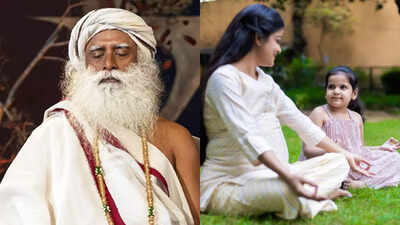ARTICLE AD BOX

Parenting is often seen as a mix of discipline, structure, and authority — a delicate balance between love and control. But spiritual leader Sadhguru Jaggi Vasudev believes parenting should be less about control and more about consciousness.
His approach, as revealed by his daughter Radhe Jaggi, is rooted in understanding, communication, and emotional awareness not punishment or fear.In a recent conversation, Radhe described her childhood as joyful but far from rule-bound. “I was a very naughty child,” she admitted, laughing. Yet her father never resorted to scolding or threats. Instead, whenever she made a mistake, he would calmly ask her two simple but deeply reflective questions:“Kya hua?” (What happened?) and “Kyu kiya?” (Why did you do it?)
Parents vs. Dreams? Sadhguru's advice on handling conflict
The power of two questionsAt first glance, these questions might seem basic, but they carried profound meaning.
Instead of intimidating Radhe, they invited her to think, to understand the motivation behind her behaviour. This simple exercise replaced punishment with self-awareness, helping her take responsibility for her actions without fear.As Radhe shared, these conversations made her feel heard rather than judged. Over time, she learned to pause, reflect, and make thoughtful choices not because she feared consequences, but because she understood them.
Beyond authority — building emotional connectionSadhguru’s philosophy challenges the idea that strictness equals good parenting. According to him, authoritarian control can cause long-term emotional harm. “When parents act like dictators,” he says, “children may obey out of fear, but they disconnect emotionally.” Over time, this can lead to rebellion, anxiety, or seeking validation outside the home from peers, social media, or other influences.He warns that many parents unconsciously project their own unfulfilled dreams onto their children, forcing them into careers or expectations that don’t align with their passions.
“Trying to make your child what you failed to become,” Sadhguru says, “is one of the biggest mistakes a parent can make.”Parenting in the digital ageToday’s children are growing up in a world far different from the one their parents knew. With constant exposure to technology, social media, and global influences, old-fashioned strict parenting methods no longer work. Sadhguru believes that connection, not control, is what earns a parent true influence.He emphasizes that the best thing parents can offer is a home filled with love, joy, and stability. A child raised in an environment free from shouting, jealousy, and fear will naturally develop confidence and emotional intelligence.Children are not possessionsOne of Sadhguru’s most powerful reminders is that children are not property — they are independent beings on their own journeys. Parents, he says, should act not as owners but as guides.
“Your role is to support, not to shape,” he explains. By offering guidance instead of orders, parents allow their children to grow into thoughtful, capable individuals.How to practice Sadhguru’s parenting philosophy at homeEncourage Dialogue Over Dictation: Replace commands with conversations. Ask questions that help your child reflect and understand.Replace Criticism with Curiosity: Instead of judging, explore the “why” behind your child’s actions.Be a Guide, Not a Dictator: Use logic and empathy to lead your child toward wise decisions.Teach Through Experience, Not Fear: Allow mistakes to become learning opportunities.Create Emotional Safety: Let your child know they can come to you without fear of being scolded.Parenting through awareness, not authoritySadhguru’s parenting style is a masterclass in conscious parenting, an approach that values awareness, communication, and empathy over control. His daughter Radhe’s upbringing shows that children thrive when they feel safe, understood, and trusted.In a world where parenting advice often swings between rigidity and permissiveness, Sadhguru’s philosophy reminds us that the true art of parenting lies in helping children think, not just obey and grow with love, not fear.

 1 hour ago
4
1 hour ago
4








 English (US) ·
English (US) ·